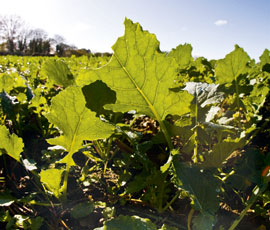Variety choice in OSR key to yields

Oilseed rape yield trends have failed to reflect variety improvements, according to a speaker at the recent Crop Protection in Southern Britain conference in Peterborough.
Over the years oilseed rape yields have shown high levels of fluctuation that have hidden a long-term yield trend. There have been many different contributing factors, from indirect effects of changes to the CAP to the weather and OSR prices.
Variety trials show yield potential has increased steadily, but according to NIAB TAG’s Simon Kightley this potential has not been achieved on farm.
“Yields have been heavily influenced by economic considerations, resulting in sub-optimal variety choices and use of reduced tillage systems.”
Farmers have preferred varieties with good agronomic characters, rather than prioritising yield from newer varieties with less manageable traits.
“There has been relatively little focus on cost saving in crop protection and, having increased sustainability in the mid-1990s/early 2000s, the use of fungicides has remained at a high level,” he said.
“While the importance of growing a range of varieties to suit different growing conditions and to minimise risks from environmental variables should be recognised, the message of the importance of variety choice for maximising yield must be reinforced.”
Mr Kightley concluded that further research could be needed. “It’s encouraging to believe that crop protection is currently robust and reasonably effective, but soil pathogens related to short rotations remain to be fully researched.”
More from the Crop Protection in Southern Britain Conference
Spring cropping can slash blackgrass
Clethodim could add to blackgrass armoury
Product choice key in reducing fusarium ear blight

